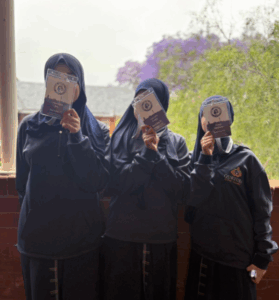The International Institute of Islamic Thought (IIIT), a global organisation focusing on social awareness and education, hosted a Summer School at the Palm Continental Hotel in Mayfair, Gauteng, earlier this month.
Twenty students from seven African countries attended the six-day event, hosted by the IIIT and supported by Awqaf South Africa, an NGO that works towards creating sustainable models of socio-economic and intellectual development in southern Africa.
The IIIT was established in 1981 by the Palestinian-American philosopher, Dr Ismail al-Faruqi, as a non-profit, non-denominational organisation. Its headquarters are in Herndon, Virginia, in the suburbs of Washington, DC.
This year’s South African Summer School was themed, “the Epistemological (the methodical study of) Integration, and its Applications in Africa”.
Emeritus Professor of Religious Studies at the University of KwaZulu-Natal, Abul Fadl Mohsin Ebrahim, who also serves as IIIT’s coordinator in southern Africa, said that for almost 40 years, the IIIT has been a voice for moderation, diversity and modernity in Islamic thought.
“With our emphasis on concepts such as co-existence, and capacity building of communities to address their challenges, we at the IIIT have been able to become a significant voice of the Muslim intellectual tradition in the west, and a champion for scholarship, knowledge and learning in Muslim societies internationally.
“What we try to do in our South African Summer Schools is no exception to this rule of striving for global intellectual excellence,” he said.
At the school, attendees were given a comprehensive perspective on Islam before zoning in on regional applications and understandings. The context of Qur’an and the Sunnah, the Prophetic model, were examined before progressing to contemporary Islamic thought and the modern challenges of Shari’ah.
Dr Said Nassoro Jaff, a lecturer at the Morogoro Muslim University in Tanzania, began his presentation by critically appraising the condition of the Muslim ummah, and highlighting the hindrances and impediments to the integration of knowledge.
Professor Abdul Hafiz Walusimbi, from the International Islamic University of Mbane in Uganda, painted a gloomy picture of the current state of the Muslim community, but then juxtaposed that by observing Islam was the fastest growing religion on earth.
As such, it was gaining global acceptance and recognition, and the good news was that Muslims were today coexisting and cooperating at all levels in civil society. He elaborated on the significance of Islamic Jurisprudence in the contemporary era, and how its challenges could be resolved in light of the Maqasid al-Shari’ah, the principles of which were established as a benefit for all.
Dr Shaheed Mathee, lecturer in Religious Studies at the University of Johannesburg, addressed the significant role that Fatawa, or juridical edicts, played in African intellectual and historical history, by drawing examples from Timbuktu, once a beacon of world Islamic thought.
The Summer School also broke new ground when it introduced attendees to the concept of Islamic Medical Jurisprudence. Professor Ebrahim touched upon the sources of Islamic Medical Jurisprudence as well as family planning, assisted reproductive technologies (ART) and organ transplantation.
According to Prof Ebrahim, there was lively discussion throughout the six days and the attendees reported that the scope of the course was “music to their ears”. Many of them expressed that having studied Islam for so many years, they never thought of the relevance of integrating Islamic knowledge into the secular disciplines.
It made them realise the deeper wisdom behind Qur’anic verses and Hadith reports. They said that they were invigorated to apply what they have learnt back in their respective countries. They even realised that the school curriculum, and even the Islamic University and Darul Ulum curricula, needed to be revised.
Prof Ebrahim added that a deepening perspective in how to transform society through sustainable Islamic trusts, or waqf, was facilitated by Zeinoul Abideen Cajee, the CEO of Awqaf SA, who spoke about the institution of waqf.
Commenting on the event, which he rated as an outstanding success, Cajee said Awqaf SA had identified suitable attendees, with the IIIT responsible for vetting and providing sponsorships.
“Awqaf SA has a long standing relationship with IIIT. One of the areas that Awqaf SA promotes is the development of intellectual capacity in our region. IIIT is a specialist resource and provides that development. It makes an excellent partner for collaboration. IIIT brings much needed, and beneficial intellectual ideas and research, to the table from a wide range of scholars located in various parts of the world,” he said.


